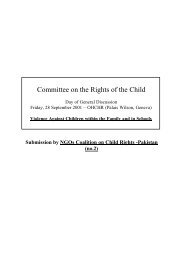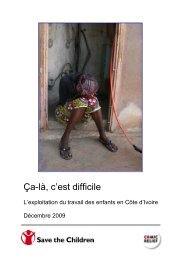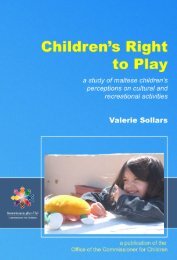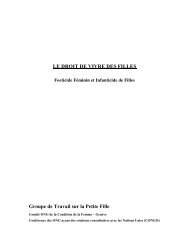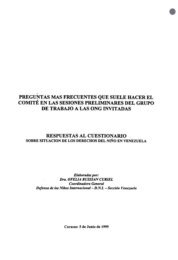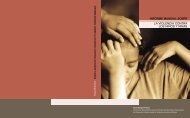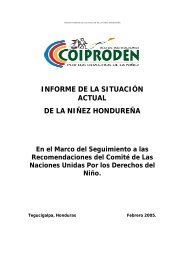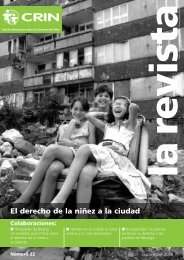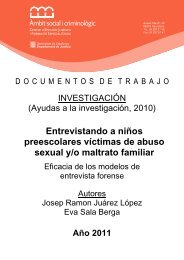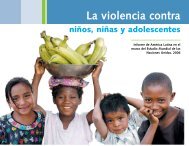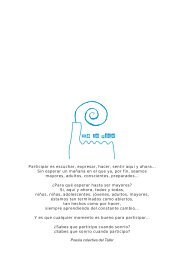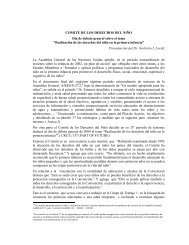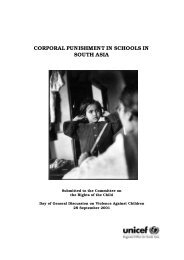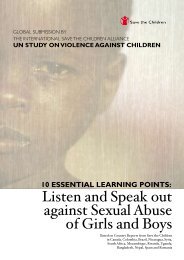Universal Periodic Review: The Status of Children's Rights - CRIN
Universal Periodic Review: The Status of Children's Rights - CRIN
Universal Periodic Review: The Status of Children's Rights - CRIN
You also want an ePaper? Increase the reach of your titles
YUMPU automatically turns print PDFs into web optimized ePapers that Google loves.
Child <strong>Rights</strong> Information Network (<strong>CRIN</strong>) NGO Survey Findings<br />
“Start the preparation process earlier and conduct a clear analysis <strong>of</strong> policies and practices in order to<br />
reflect accurate information to the UPR”<br />
2. A more effective follow-up plan<br />
As highlighted above, a number <strong>of</strong> organisations agreed that the overall follow-up approach carried out by NGOs on<br />
UN mechanisms was inadequate and urgently needed addressing, and the UPR was no different in this respect. <strong>The</strong><br />
organisations emphasising the importance <strong>of</strong> a stronger follow-up plan were largely the international NGOs who had<br />
more capacity and resources than national NGOs.<br />
One international NGO stated:<br />
“Adopt a better follow-up plan after the review and use the recommendations and any sign <strong>of</strong> positive<br />
response from the State. At the same time, provoke others to do the same”<br />
Another reported:<br />
“Focus on following up the outcomes <strong>of</strong> the review in a more structured and calculated way”<br />
Another NGO mentioned the important role the media could play in following up the outcomes <strong>of</strong> the review. Few<br />
organisations commented on their interaction with the media on the UPR. Once more, this is an important area that<br />
requires further research in order to collate successful examples <strong>of</strong> media coordination.<br />
3. Increase participation <strong>of</strong> children in the reporting process<br />
Whilst very few NGOs had involved children in the reporting process for the UPR, a number <strong>of</strong> organisations<br />
highlighted this as a priority for future reporting, signalling their views that the participation <strong>of</strong> children would enhance<br />
their engagement with the mechanism.<br />
4. Encourage participation <strong>of</strong> more NGOs<br />
<strong>The</strong> overall lack <strong>of</strong> awareness about the UPR, and how it works, regularly surfaced in the responses, particularly when<br />
organisations were talking about fellow national and local NGOs, those distant from the Geneva arena. Whilst some<br />
organisations had already promoted awareness <strong>of</strong> the UPR, its benefits and ways to engage with this new mechanism,<br />
many acknowledged that this is an important area to focus on.<br />
5. Stronger lobbying, particularly making use <strong>of</strong> international lobbying<br />
<strong>The</strong> majority <strong>of</strong> organisations acknowledged the power <strong>of</strong> lobbying for this new mechanism, but either had not had the<br />
time or the capacity to do this, or were unaware <strong>of</strong> how to do it.<br />
One person said:<br />
“We need to apply more intensive lobbying, through our Geneva <strong>of</strong>fice, on States and troikas to push our<br />
issues.”<br />
52



